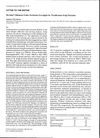 25 citations,
July 2019 in “Journal of drug delivery science and technology”
25 citations,
July 2019 in “Journal of drug delivery science and technology” Researchers created better skin-application menthol capsules that are stable, safe, and penetrate the skin quickly.
October 2024 in “International Journal of Pharmaceutics” The finasteride patch effectively treats hair loss by enhancing skin absorption.
2 citations,
January 2024 in “Pharmaceuticals” Deep eutectic solvents are eco-friendly and effective for extracting useful pharmaceutical compounds.
28 citations,
September 2021 in “EMBO reports” Osthole inhibits the TRPV3 channel by binding to specific sites, potentially aiding drug development for skin diseases and cancers.
 April 2017 in “The journal of investigative dermatology/Journal of investigative dermatology”
April 2017 in “The journal of investigative dermatology/Journal of investigative dermatology” Astrotactin2 affects hair follicle orientation and skin cell polarity.
 2 citations,
July 2020 in “Journal of Drug Delivery Science and Technology”
2 citations,
July 2020 in “Journal of Drug Delivery Science and Technology” Created finasteride complex to increase water solubility and drug release.
 October 2001 in “WORLD SCIENTIFIC eBooks”
October 2001 in “WORLD SCIENTIFIC eBooks” Many substances, including chemicals and metals, can cause skin reactions; careful handling and identification of allergens are crucial to prevent dermatitis.

No single biomarker is reliable enough for diagnosing and assessing SLE.
 10 citations,
January 2014 in “Journal of prosthodontic research”
10 citations,
January 2014 in “Journal of prosthodontic research” Bioengineered salivary glands in mice can produce saliva when tasting sour or bitter, but have different protein levels and nerve signals compared to natural glands.
 6 citations,
May 2022 in “Frontiers in Microbiology”
6 citations,
May 2022 in “Frontiers in Microbiology” Marine microbes could be used in cosmetics for sun protection, skin care, and possibly preventing hair loss.
 28 citations,
November 2020 in “Fluid Phase Equilibria”
28 citations,
November 2020 in “Fluid Phase Equilibria” Minoxidil dissolves better in propylene glycol + water than in supercritical CO2.

Bee pollen, green tea, essential oils, and various plant extracts improve skin and hair health.
2 citations,
August 2007 in “PubMed” Topical scalp treatments could potentially reduce hair extraction.
 December 2013 in “미용예술경영연구”
December 2013 in “미용예술경영연구” Scalp treatments increased hair density and reduced hair loss in Telogen Effluvium patients.
 January 2018 in “Journal of general practice”
January 2018 in “Journal of general practice” Young people are losing hair due to stress, poor diet, pollution, and lack of sleep, but it can be treated with supplements and scalp treatments.
 193 citations,
January 2015 in “International journal of trichology”
193 citations,
January 2015 in “International journal of trichology” Dermatologists need to understand hair products to treat hair and scalp issues better.
Low-temperature extracts of black beans, peony, and green tea improve scalp health and are better than traditional hot-water extracts.
 January 2022 in “International Journal of Health Science”
January 2022 in “International Journal of Health Science” Topical products, especially specific shampoos, are effective in treating androgenetic alopecia by delivering active ingredients to hair follicles and improving hair quality.
 June 2020 in “Journal of Dermatological Treatment”
June 2020 in “Journal of Dermatological Treatment” Use telemedicine and strict hygiene for safe hair and scalp treatments during COVID-19.
 June 2020 in “Journal of Investigative Dermatology”
June 2020 in “Journal of Investigative Dermatology” Red clover extract-based scalp treatments significantly improved hair volume and reduced hair loss and damage.
Minoxidil can treat female hair loss but may cause side effects.
 8 citations,
April 2006 in “Acta dermato-venereologica”
8 citations,
April 2006 in “Acta dermato-venereologica” Dovobet ointment used overnight effectively reduces scalp psoriasis severity and itch.
 August 1999 in “Current Opinion in Otolaryngology & Head and Neck Surgery”
August 1999 in “Current Opinion in Otolaryngology & Head and Neck Surgery” In 1999, surgical hair restoration improved a lot, making hair look more natural with fewer procedures, thanks to better scalp treatments and a new method called follicular-unit hair grafting.
 1 citations,
October 2013 in “Actas Dermo-Sifiliográficas”
1 citations,
October 2013 in “Actas Dermo-Sifiliográficas” Customized medications made through compounding can be beneficial for various skin conditions but require careful regulation and collaboration between doctors and pharmacists.
 April 2024 in “The Egyptian Journal of Hospital Medicine ”
April 2024 in “The Egyptian Journal of Hospital Medicine ” Current treatments for androgenetic alopecia manage symptoms but don't cure it, and it affects social and psychological well-being.
 25 citations,
September 2014 in “Dermatologic Surgery”
25 citations,
September 2014 in “Dermatologic Surgery” Hair transplants can effectively treat hair loss from CCCA in African American women if there's no inflammation.
 3 citations,
December 2020 in “Journal of Cosmetic Dermatology”
3 citations,
December 2020 in “Journal of Cosmetic Dermatology” Fat injections can help regrow hair in stubborn hair loss cases.
 13 citations,
January 2016 in “Journal of cosmetology & trichology”
13 citations,
January 2016 in “Journal of cosmetology & trichology” Alternative treatments show promise for hair growth beyond traditional methods.
 4 citations,
January 2021 in “Skin appendage disorders”
4 citations,
January 2021 in “Skin appendage disorders” Washing hair daily is better and preferred, with no negative effects.
 January 2024 in “Journal of Pharmacognosy and Phytochemistry”
January 2024 in “Journal of Pharmacognosy and Phytochemistry” Rosemary hair serum promotes healthier, stronger, and shinier hair.
























